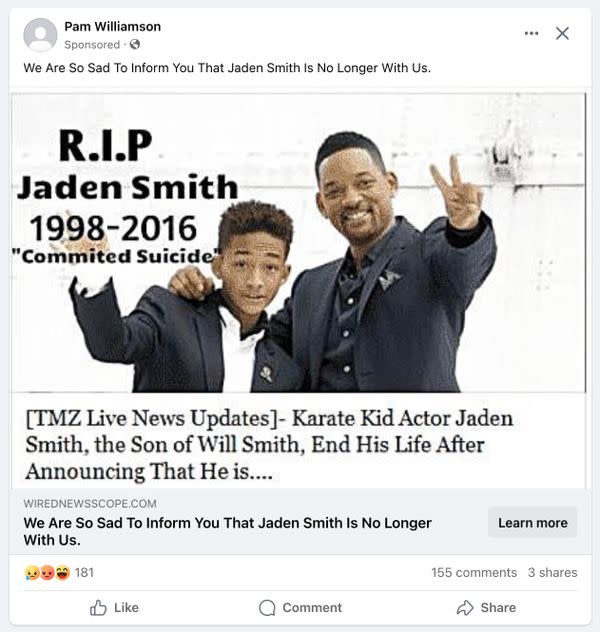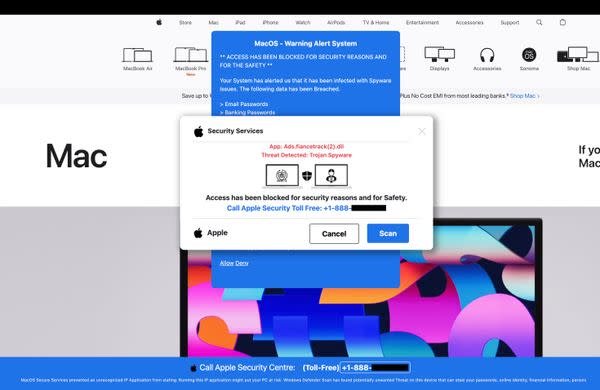In mid-April 2024, Meta – Facebook’s multibillion-dollar company – accepted money from advertisers promoting false claims that American rapper and actor Jaden Smith and British actor Rowan Atkinson had died. People who clicked on thumbnails showing the death hoax were taken to scam pages with alleged malware warnings and a phone number to share personal information.
We’ve reached out to Facebook and will update this story if we receive a response.
The ad featuring Smith read: “We are so sad to inform you that Jaden Smith is no longer with us.” The ad also shared a link with the misleading headline: “TMZ Live News Updates: ‘Karate Kid’ Actor Jaden Smith, Will Smith’s Son, Ends [sic] his life after announcing that he….”
Jaden Smith rose to fame as a child after the release of the 2006 film, ‘The Pursuit of Happyness’, which also featured his father. Additionally, the younger Smith co-starred with Jackie Chan in the 2010 film “The Karate Kid.” Meanwhile, he has been the subject of death threats over the years. Snopes has debunked several rumors that falsely claimed that Jaden Smith had died.

Separately, the ad about Atkinson read: “We are so sad to inform you that Mr. Bean is no longer with us.” Atkinson is known for creating and portraying the character Mr. Bean. As with Jaden Smith, we previously reported on false claims that Atkinson had died.


The ads led to predatory scams
The ads featuring the death hoax about Smith and Atkinson attempted to entice users to click on them – a step that would take them to a malicious website displaying alleged malware warnings. It was possible that at the time of writing, there were even more predatory ads on Facebook that used the likeness of other celebrities to get people’s attention. We discovered the Smith and Atkinson ads in one of our own feeds.
After clicking on the death hoax ads about Smith and Atkinson, we analyzed the website that tried to scare people into believing that ‘Apple Security Center’, ‘MacOS Secure Services’, ‘Microsoft Support’, ‘Windows Defender Scan’ or another service has detected a virus named “Ads.fiancetrack(2).dll” on their device. The website then showed one of several phone numbers to supposedly help. Then, that phone number connected victims to scammers posing as representatives of Apple, Geek Squad, McAfee, Microsoft, Norton, or another supposedly reputable computer security company.


Scammers ask victims about Pornhub.com
We called one of the phone numbers listed to document how the scam worked. During the phone call, the scammer pretended she could scan one of our Wi-Fi networks, despite not being given any information about who we were or how we accessed it. The scammer then claimed that she had been able to detect criminal activity on the network and asked if we had accessed Pornhub.com at 5am the previous day to view child porn. She claimed that hackers had done this and said she would immediately order the Federal Communications Commission to conduct a “secret” investigation into the matter.
This appeared to be part of one or more scripts that were repeated to people who called the phone numbers.
The scammers’ goal: steal money
In these types of scams, organizers try to trick users on the phone into granting access to a device or an account, and then use that access to steal money from bank accounts or digital payment services like Cash App, PayPal, Venmo, Zelle, and others. The scammers often ask a user to visit a website that allows them to remotely access the victim’s device, ostensibly to help fix the fake malware threat.
If there are any readers who have fallen for this scam, we recommend that you immediately contact credible phone numbers on official websites of banks, credit card companies and payment services with access to your finances. Change your login details to ensure your accounts are secure.
Facebook error says ‘Not currently showing ads’
A fake Facebook profile named “Pam Williamson” displayed one of the aforementioned Facebook ads. We visited the ‘Page Transparency’ section of that profile, where it said: ‘This page is currently not showing ads.’


This was wrong. The ad had appeared in one of our own feeds just seconds earlier. This same issue where Facebook claims a page is “currently not showing ads” (while the ads are still active) is an issue we’ve seen many times in the past. When this message appears on a Facebook profile, it means that users – including investigative journalists – are unable to properly investigate Meta’s ad library.
Thousands of paid scam ads
Facebook has been hosting ads since 2023 with links leading to fake threat detection pop-up websites – such as the Jaden Smith and Atkinson ads. We previously documented a similar scam on a desktop version of Facebook in January 2024. In that case, one of many paid Facebook ads in the right column, which were deceptively designed to look like Facebook notifications.
👀 WATCH: For months, Meta has been hosting these scam ads that use an image of a Facebook notification icon. The ads eventually load a scam page that displays an alert about a security product from McAfee, Windows Defender, Microsoft, or Apple with a phone number going to scammers. pic.twitter.com/mUhHKDaUCn
— Jordan Liles (@jordanliles) January 24, 2024
Over the past few years, Snopes has seen firsthand that Meta has approved and then served at least thousands of paid scam ads to users.
Sources:
“Jaden Smith.” IMDb.comhttps://www.imdb.com/name/nm1535523/.
Ortutay, Barbara. “Meta posts sharp profit and revenue growth in Q4 thanks to cost savings and advertising recovery.” The Associated PressFebruary 1, 2024, https://apnews.com/article/meta-facebook-instagram-earnings-revenue-profit-abc3e389d97fb97c661ccb6acfcf65c7.
“Registration data lookup tool.” ICANN.orghttps://lookup.icann.org/en/lookup.
“Rowan Atkinson | Biography, Movies, TV Shows and Facts.” Britannicahttps://www.britannica.com/biography/Rowan-Atkinson.